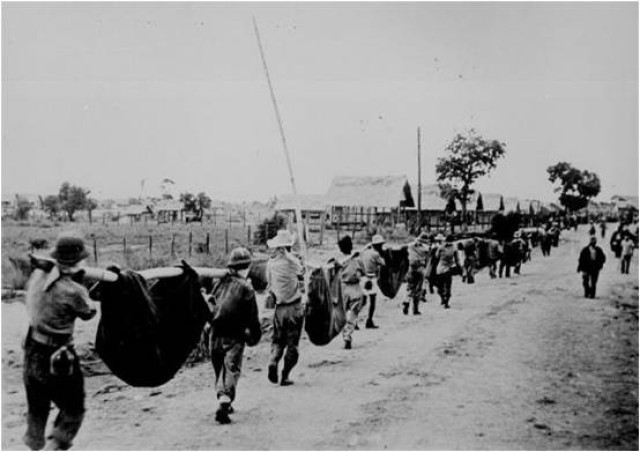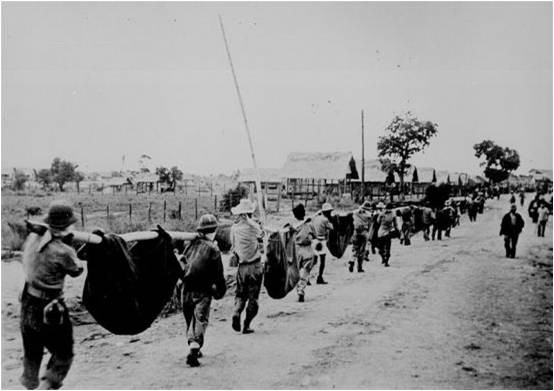
FORT SHAFTER, Hawaii--About 35 senior leaders from the U.S. Army, Pacific gathered to hear the story of Staff Sgt. (Ret.) Guillermo Gutierrez in USARPAC's Command Conference Center at Fort Shafter on Friday, April 23. Gutierrez, a veteran of World War II, the Korean Conflict, and the Vietnam War, spoke with the leaders about his experiences as a Prisoner of War and survivor of the Bataan Death March during World War II.
Gutierrez's visit to the USARPAC, was part of a series of lectures addressed to officers and noncommissioned officers in upper-level management positions as part of the Senior Leader Development Program. Sponsored by Lt. Gen. Benjamin R. Mixon, commanding general, USARPAC, the SLDP seeks to emphasize the lessons learned from history.
For the 2010 SLDP series, Mixon is focusing on the lessons learned from the U.S. Army's role in the Pacific during World War II.
"It helps to focus on lessons learned, particularly on mistakes made and successes achieved during World War II in the Pacific," said Dave Hilkert, command historian for the U.S. Army, Pacific, and coordinator of the 2010 SLDP series. "What we want to do is explore what happened from 1941 until 1945, and then consider the lessons we can draw from that war that we can apply to the military craft today.
"We really planned for the wrong war," said Hilkert. "We were looking to defend ourselves here in Hawaii with coast artillery against an amphibious landing. In fact, the Japanese were planning the use of their aircraft carriers, and that took us completely off guard."
The SLDP has held two sessions so far, and already themes have come out, said Hilkert. "One of the themes that has surfaced a couple of times is flexibility of American officers and NCOs," he said. "Even though we learn by doctrine to do one thing, we have to train and prepare to think 'outside the box'. We often have to implement strategies that respond to unique situations in our Pacific theater."
Gutierrez, the speaker for the April 23 SLDP, was a scout in the Filipino army when the Japanese attacked the Philippines on December 8, 1941. The Filipino army and units of the U.S. Army in the Philippines held off against the Japanese for four months, but then surrendered after the Soldiers' supplies and ammunition dwindled to unsustainable amounts.
After the surrender, Gutierrez and 75,000 Filipino and American Soldiers became prisoners of war, and were forced to march 61 miles through the jungle in the Philippines. The Bataan Death March, as it was called, was brutal; thousands of Filipino and American Soldiers died during the march. Those who survived remained prisoners of war until the Japanese surrendered in 1945.
The first-hand account of a junior enlisted Soldier who survived one of the ugliest military scenarios of World War II had a great impact on the leaders who attended the SLDP.
Capt. Ryan Mento, commander of USARPAC Operations Company, was able to take with him several lessons from Gutierrez's visit. Gutierrez's experience highlighted the repercussions of the decisions and lack of preparation by senior leaders, he said.
"Staff Sgt. Gutierrez's story from the perspective of a junior enlisted Soldier forced to endure a bitter defeat and inhumane treatment due to the decisions and lack of preparation by senior leaders affected me greatly," he said.
"The fact that Staff Sgt. Gutierrez can still remember what happened to him during the march from Mariveles to Capas was amazing and truly a testament to his willingness to survive, and to his resolve to make sure others would know what happened to the American and Filipino Soldiers who were forced to tasted a bitter defeat and internment," said Mento.
Hilkert said one of the lessons learned at the SLDP was the importance of maintaining a chain of command even in the direst of circumstances. Mento was able to recognize the importance of maintaining a team mentality, especially in desperate conditions.
"As individuals, we break," he said. "If we are inexperienced, we break. It is important that Soldiers stick together and have a strong chain of command to prop up the team as a whole. Soldiers will have to rely on collective strengths and experiences to prop up individual weakness. The one thing Staff Sgt. Gutierrez's story did teach us is that despite a terrible situation, there is always hope through mutual support and resolve."
Senior leaders of USARPAC will continue the SLDP series on May 7, when Alan S. Lloyd, a historian and expert on naval warfare, will lecture about the Battle of Midway at the USARPAC headquarters.

Social Sharing